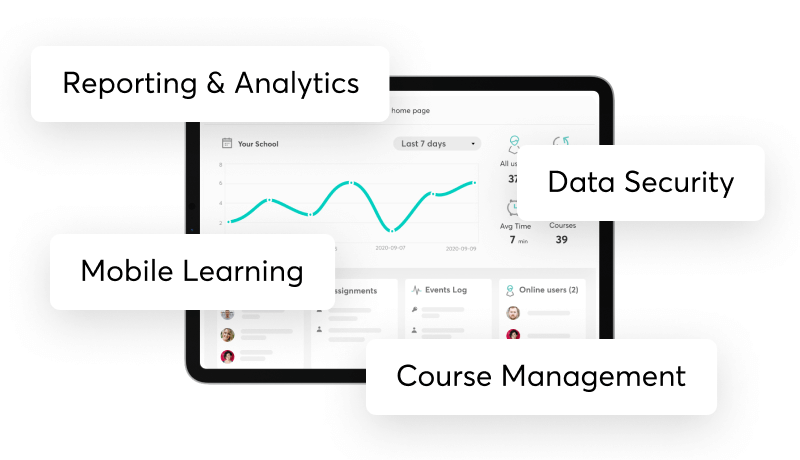Table of Contents
Choosing an LMS is one of the most important decisions you’ll have to make when deploying partner training. Browsing the LMS vendor’s product page is nowhere near enough to get an accurate estimation of whether they can actually meet your training needs and support you in your goals – you need to dig deeper.
If this is your first time using an LMS or if you have suffered mishaps in the past, no need to worry, as this blog post will provide you with all the answers you need!
Our Request for Proposal (RFP) checklist narrows down all the key questions you must ask LMS vendors, so you can identify the one that meets your requirements without ending up wasting money on a platform that has too many features you don’t even need or too few that will jeopardize the effectiveness of your program.
To compile this list, we have consulted RFPs submitted by our own potential clients and have singled out the most commonly asked questions and requirements.
Before embarking on the pursuit of the perfect LMS, though, make sure you have done a proper training needs analysis and that you’re very clear about your business goals. Training and business goals are interconnected and should be looking in the same direction.
To help you make the best use of this checklist, we have grouped the requirements to look for into categories. We also provide you with a downloadable template for quick access.
AN LMS RFP (Learning Management System Request For Proposal) is a document that outlines the desired LMS features and business/training goals of an organization looking for an LMS solution.
An LMS RFP is helpful for both parties involved. On the one hand, the buyer gets to:
The LMS vendor, on the other hand, can better understand whether they can successfully meet the needs and expectations of the client and craft a proposal that fits their requirements.
The RFP process typically involves a number of stages, usually starting with the creation of the RFP template, the identification of potential vendors, the evaluation of vendor proposals, and the selection of one or more vendors if the buyer prefers to test some options first before making a purchase.
Overall, an LMS RFP is an important tool for organizations looking to implement a new LMS, as it helps to ensure that the chosen LMS is aligned with the organization’s needs and goals. It provides a solid foundation for effective training and development initiatives.
An LMS RFP typically is structured with two key sections, consisting of several components to provide a comprehensive overview of your company’s needs and expectations and evaluate the capabilities and suitability of potential LMS providers.
In the first section, you provide an introduction to your company, along with your key requirements and expectations. This section helps the LMS vendor quickly assess if their product aligns with your needs. The second section -which is also further divided into sub-sections- is usually more extensive and focuses on evaluating the potential LMS vendor. Here, you ask questions to determine if the vendor can meet your organization’s requirements.
Let’s delve into each section, examining them in detail below.
First Section: About You
The first section of the RFP should be an introduction to your company, as well as your key requirements and expectations.
This section is significant because it will help the vendor understand at a glance whether their product is suitable for your needs and if they meet your criteria. Here are some of the components this section includes:
Second Section: LMS Provider
This section will be much longer and more comprehensive. This is where you’ll ask all the questions that will help you understand whether the LMS vendor can meet your needs.
Even if you don’t know exactly what to ask, don’t worry – we have laid down all the key features an LMS needs to have in order to bring true value to your organization!
Needless to say, you need to ask as much about the product as possible, starting from the most generic information and drilling down to the slightest detail that is important to you.
Let’s start with the basics:
Company Information
Product Information
Course Management
The system’s course-building capabilities are decisive, as this is the main product you’ll be offering your clients/partners.
Content Management
Content management refers to the options the platform offers when it comes to creating and structuring eLearning content.
Content types you should look for:
User Management & Authentication
User management refers to actions that enable administrators to easily manage users and user data. Some things you should ask are:
Website Branding & Customization
It’s important that the LMS you pick enables you to build your own website to sell your online course and give you the tools for your brand to shine.
Learning Delivery
Learning delivery is another component that matters, especially if you want to deliver training in multiple ways.
Mobile Learning
Mobile learning is for many companies a prerequisite, especially when they have a deskless workforce that needs access to training while on the job. And while mobile-friendly is nearly a given these days, you still need to ask about available options.
Assessments
Assessment is not just a way to evaluate learner knowledge but rather to reinforce learning and challenge learners during their journey. During an assessment, learners get to actively recall information and see how they can apply it.
Assessments also give instructors the opportunity to identify learners that are falling behind and offer them timely help while being an effective way to evaluate the difficulty level of the course. Make sure the platform you pick has a robust assessment engine, as this is one quintessential tool we’re talking about:
Surveys
Surveys are a multi-purpose tool that you can use for lead capturing, pre-evaluations, and receiving learner feedback.
Certificate Management
A certificate automatically increases the inherent and price value of your program. Not only that, but providing a certificate validates the hard-earned skills the learner has developed, and, in some cases, they can help monitor compliance and ensure this knowledge has value for as long as it remains relevant and fresh.
Social Learning & Collaboration
We tend to learn better not just because we are social creatures but when we are in the company of others.
Interacting with peers is not only a matter of preference and keeping things exciting – learning with others is highly beneficial because others expand our knowledge and challenge our way of thinking. Collaborative learning is learning that happens naturally, with less effort and has a more lasting impact.
Reporting & Analytics
Checking your reports is the “aha” moment, the moment of truth. An eye-opening tool that can give you reliable data, so you don’t have to go with your gut feeling or do experiments and hope for the best.
eCommerce Features
If you want to sell your course, then you must ask about the system’s eCommerce capabilities, as most heavy-weight LMSs tend to overlook these features and focus on learning features only.
Data Security
You don’t need to be in a high-risk industry to worry about your data. Data privacy should be a top priority to ensure everyone’s personal and financial data is protected, as data leakages can be detrimental to your reputation.
Customer Training & Support
Whether the LMS you choose is easy as pie to install and work with or requires advanced tech skills, you always need to ensure that the LMS vendor provides excellent support when you need it.
Integrations & APIs
There are thousands of integrations you could ask about, so list the ones you already use that could help you deliver your program more effectively.
Pricing & Additional Fees
The “awkward” moment when you have to ask for the price… not so much, though. Budget is a serious consideration for many companies, so you want to make sure that there will be no surprises down the road.
How to Keep Track of Vendors’ Responses
When evaluating potential LMS vendors, it’s important to first figure out how important each feature and functionality is and take that weight into consideration to draw an accurate conclusion.
It helps to set a numerical system from 1 to 5 to evaluate each feature and rate the importance accordingly – Not important, Somewhat important, Important, Very important, and Essential.
💁 For example, if you’re in a heavily regulated industry and need advanced certificate management with expiration dates and automatic reminders, but the platform only offers a basic certificate builder, you can evaluate them with a 2.
After you have figured out your top candidates, we suggest leveraging a free trial or a simulation in a sandbox environment
| Vendor name | [name] |
|---|---|
| Link to website | [link] |
| Link to the sandbox environment | [link] |
| Feature A | [score based on availability + importance] |
| Feature B | [score based on availability + importance] |
| Price | [insert data] |
| Notes | [insert notes] |
| Total score | [average score] |
Final Thoughts
While searching for an LMS may not be as exciting as finding vacation accommodation, utilizing this checklist will greatly simplify the selection process and yield superior outcomes compared to random inquiries. Instead of spending countless hours on calls and demonstrations, consider submitting this comprehensive LMS RFP to identify the most suitable solution for your training initiatives effectively.
Further reading

Androniki Koumadoraki
Androniki is a Content Writer at LearnWorlds sharing Instructional Design and marketing tips. With solid experience in B2B writing and technical translation, she is passionate about learning and spreading knowledge. She is also an aspiring yogi, a book nerd, and a talented transponster.





